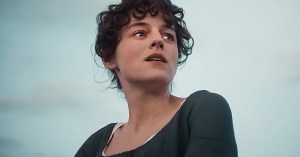Kim Newman on… Hotel
RT Obscura 16: Star-Studded Vampire Hijinks from Mike Figgis

RT Obscura, the exclusive column by renowned critic Kim Newman, sees the writer plumbing the depths of the RT archive in search of some forgotten gems. In his 16th column, Kim revisits Mike Figgis’ star-studded film-within-a-film vampire flick Hotel.
Shot fast and cheap in Venice in 2001, Hotel is even looser than director Mike Figgis‘s earlier Timecode. That had to keep four images in some sort of sync and thus could ill-afford sloppiness, but this improvised effort (Figgis’s background is in jazz, which says a lot) is lopsided, wilfully strange, not always coherent and feels as if lost hours of ‘deleted scenes’ might explain things.
The 24, mostly-excellent ‘web shorts’ included as an extra on the DVD don’t actually help with the story, but at least give actors who barely register in the actual film a shot at getting a laugh. They don’t seem to be online as of this writing, which is a shame. Despite everything, Hotel is a fun watch, has a freewheeling feel, is full of good jokes, and stretches to unusual creepy or erotic sequences. Even viewers who reject it out of hand (and there will be a lot) will find some scenes sticking in the memory — though I’d worry about anyone who tries to copy the kinkier stuff.

In the opening, guest Omar Johnson (John Malkovich) joins the staff of the Hungaro Hotel in Venice in a meal, which he partakes in from behind bars in a basement. The fare on offer turns out to be prosciutto made from human flesh. It seems the manager (Danny Huston) and his observant, odd staff — not to mention a huffy tour guide (Julian Sands) — are some variety of vampire, and they lurk in the background or around the margins, waiting for the unwary to wander into their clutches (Figgis consigns several of his most loathesome characters to their larder).
The guests are filmmakers working on a loopy-sounding Dogme version of John Webster‘s Jacobean The Duchess of Malfi. The nearly covert plot involves an assassination attempt which puts flamboyantly difficult director Trent Stoken (Rhys Ifans) in a coma so that sneaky producer Jonathan Danderfine (David Schwimmer) has to take over the film, a process which involves getting close to Stoken’s girlfriend-star Naomi (Saffron Burrows).

We get a few scenes from Malfi, as adapted by Heathcote Williams (who also plays Boscola), and glimpse what Burrows (“I am Duchess of Malfi still”), Mark Strong and other talents could make of the text; the play is so grotesquely violent and demented there has to date been no serious attempt to film it. There are sly send-ups of the Dogme film movement (“it means it will be badly-lit”), though the film-within-a-film scenes are actually slicker than the surrounding stuff. Salma Hayek shows up as the monstrous ‘Charlee Boux’, a catty cable TV documentary host who comes on like a feral version of the Geraldine Chaplin character from Nashville and enjoyably gets into a hissing fight with a rival (Lucy Liu) which echoes the animal snarling director and producer do at each other. Ifans is a lively, powerful, funny presence as a director who might be either a genius or a total idiot, and the film’s energy level sags notably when he’s in a coma.
There’s an entertaining if queasy emphasis on weird sex — with Stefania Rocca as a red-dressed call girl who dips her breasts in champagne glasses of milk for the benefit of a crass movie financier (George DiCenzo), quarter-of-the-screen vampire lesbian business, a peculiar sequence from Malfi in which Burrows takes the male role in a doggystyle sex scene before giving birth to twin baby dolls and Trent’s return from coma when his nurse (Chiara Mastroianni) uses him as a ceremonial sex aid.

Given that this is a movie which trades a lot on connections, note how many of the cast have been in vampire movies (admittedly, some made after Hotel): Malkovich (Shadow of the Vampire), Huston (30 Days of Night), Sands (Tale of a Vampire), Rocca (a 2002 made-for-TV Dracula), Liu (Rise), Hayek (From Dusk Till Dawn), Burrows (Perfect Creature); then again, maybe there are so many vampire movies around that any large-cast film will have a simialr record.
Also floating about are Valeria Golino as an actress who complains all her lines have been cut but she still has two nude scenes, Jason Isaacs as an Aussie star who quits when he gets a Ridley Scott film (guess who this is a jab at?), Burt Reynolds (!) as the spokesman for a flamenco troupe (if he really improvised his terrific, double-edged big speech, we’ll have to reassess him as a writer), Valentina Cervi as a maid and Alexandra Staden (who played Modesty Blaise in the direct-to-DVD My Name is Modesty) as a p.a. (barely visible in the film, but very funny in two of the ‘web-based shorts’ inclduing a wonderfully sustained phone routine about ordering drugs for the wrap party).

If Timecode was one movie occupying four equal screens, Hotel (which uses the Timecode splitscreen for several sequences) is more like four films which occupy the same screen — a Player-ish filmbiz comedy, that Dogme Duchess, the vampire picture and a sex/assassination conspiracy thriller. Perhaps predictably, this took a critical pasting; though, frankly, it’s got far more going for it than the ‘proper’ movie (Cold Creek Manor) Figgis made at about the same time.
Like Michael Winterbottom, Takashi Miike, Fassbinder or even Jesus Franco, Figgis is so prolific that he can afford to turn out experimental movies between more mainstream efforts, and seems to be more interested in stretching himself and playing with new toys (he designed his own camera rig for this) than turning out a consistent oeuvre. Like all of the above cited directors, he takes the risk of dashing off an indulgent exercise which befuddles more than it delights. And it is a risk — Alex Cox did one of those larks, Straight to Hell, and self-destructed a promising career.

Though it scores high on the “oh come on, now” meter, there are things in Hotel that repay repeat visits. And don’t miss the shorts — if only to see Danny Huston and Saffron Burrows doing what amounts to a Monty Python routine about the hotel bell and a marvelous standalone scene in which the producer has to bail his director and an actor out of an Italian jail before the show can go on.






